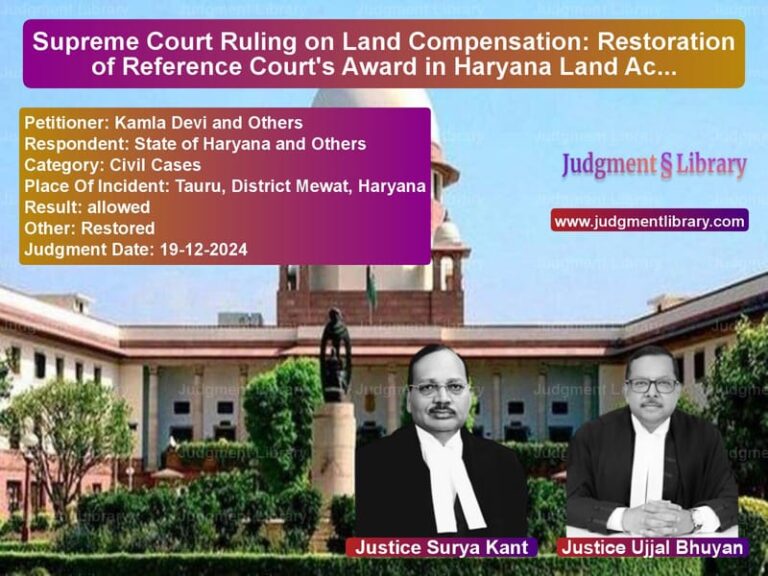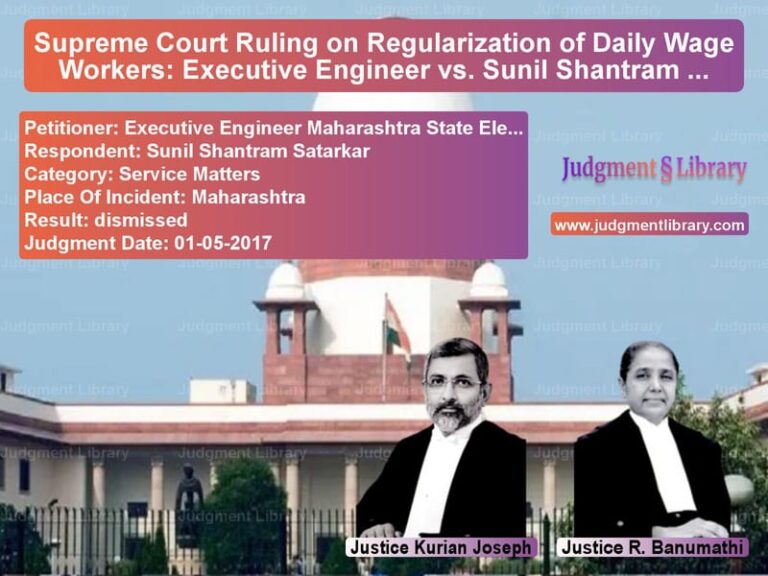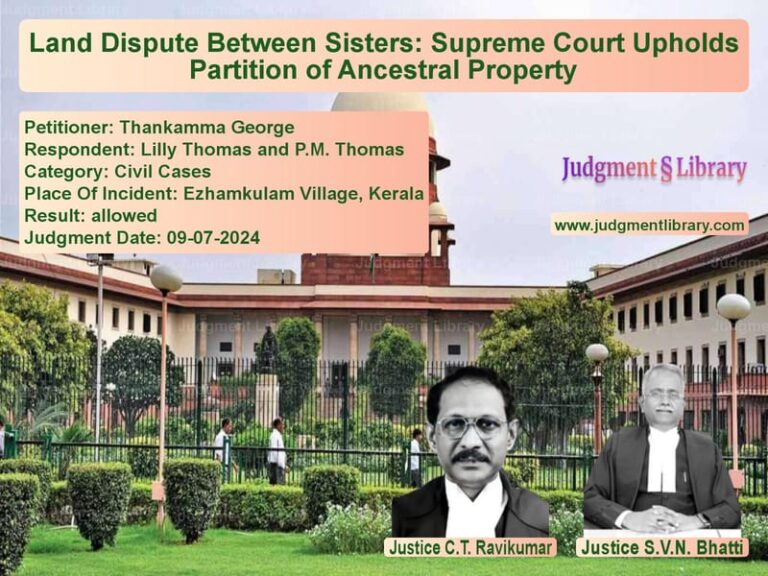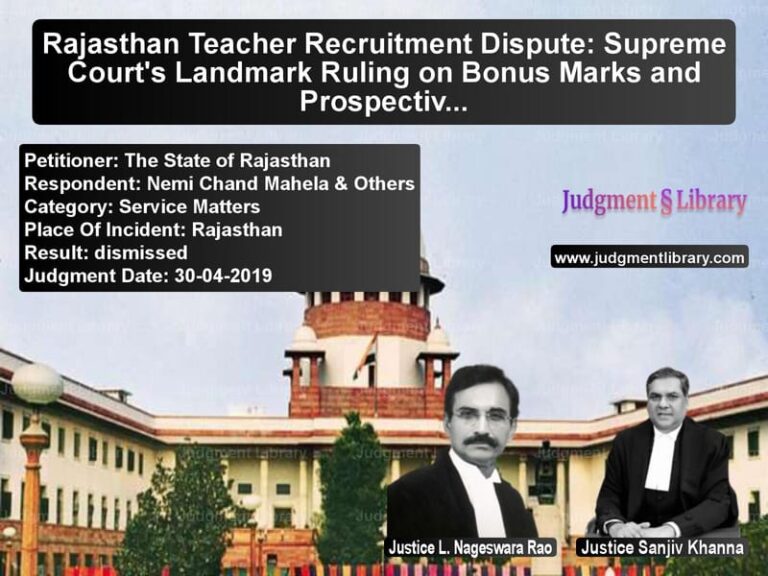Unfair Legal Representation: Supreme Court Orders Retrial for Life Convict
The Supreme Court of India recently delivered a crucial judgment in the case of Niranjan Das @ Niru Das @ Mahanto v. State of West Bengal. The case revolved around a major procedural lapse in a criminal appeal, where the High Court failed to ensure effective legal representation for an accused sentenced to life imprisonment under Section 302 of the Indian Penal Code (IPC).
The Supreme Court’s decision to set aside the High Court’s ruling and order a retrial underscores the fundamental right to legal representation and the principles of fair trial, especially in serious criminal cases.
Background of the Case
The appellant, Niranjan Das, was accused No. 2 in a case involving a charge of murder under Section 302 of the IPC. The trial court convicted him and co-accused Subodh Rajbanshi, sentencing them to life imprisonment. Notably, the conviction was under Section 302 simpliciter, meaning that the court did not invoke Section 34 (common intention) of the IPC.
Both accused individuals filed separate appeals against their convictions before the Calcutta High Court. The appeals were heard on May 12, 2022. However, on the day of the hearing, Niranjan Das was unrepresented as his advocate was absent. The High Court appointed an empaneled advocate from the Legal Services Authority to argue the case on his behalf.
Despite this appointment, the advocate was not given adequate time to study the case files and prepare for arguments. Instead, the High Court proceeded with the hearing on the same day, leading to a perfunctory defense on behalf of Niranjan Das. The advocate merely adopted the arguments of the co-accused’s lawyer and made an erroneous submission regarding common intention under Section 34 of the IPC—an element that was not even applicable in the case.
Recognizing the severity of this procedural lapse, Niranjan Das approached the Supreme Court, seeking a retrial on the grounds that he was denied his fundamental right to effective legal representation.
Key Legal Issues
- Was the appellant given a fair opportunity to defend himself before the High Court?
- Did the High Court err in proceeding with the appeal hearing without granting sufficient time to the court-appointed lawyer?
- Should the case be remanded for fresh consideration in light of the procedural shortcomings?
Petitioner’s (Niranjan Das) Arguments
- The petitioner contended that the High Court violated his right to a fair trial by appointing a lawyer on the day of the hearing without granting sufficient time for preparation.
- The appointed lawyer’s lack of familiarity with the case led to ineffective representation, depriving the petitioner of a proper defense.
- Given the serious nature of the case and the life imprisonment sentence, the High Court should have ensured that the accused had competent legal representation before deciding the appeal.
Respondent’s (State of West Bengal) Arguments
- The State contended that the High Court followed due procedure by appointing an advocate for the unrepresented appellant.
- Since the advocate adopted the submissions made in the co-accused’s appeal, it indicated that she was adequately prepared.
- The State argued that the High Court had the discretion to decide the case based on the available evidence and arguments presented.
Supreme Court’s Observations and Ruling
The Supreme Court found serious flaws in the High Court’s handling of the appeal. The key observations made by the Court were:
- “This was a case where the appellant was convicted for the offence punishable under Section 302 of the IPC and was sentenced to undergo life imprisonment. Therefore, it was a duty of the Court to give a reasonable time to the advocate appointed to go through the file and get ready to assist the Court.”
- “The very fact that such submission is made shows that the advocate was not ready with the matter, as there was no conviction of the appellant with the aid of Section 34 of the IPC.”
- “This happened obviously because the appointed advocate was not given time to prepare herself. There were 20 prosecution witnesses in this case.”
The Supreme Court held that the lack of adequate time for the appointed advocate to prepare for the case violated the fundamental principles of natural justice and the right to a fair trial. Consequently, the Court set aside the High Court’s decision and remanded the appeal for fresh consideration.
Directions Issued by the Supreme Court
- The appeal was remanded to the High Court for fresh consideration, ensuring that the appellant receives proper legal representation.
- The Supreme Court directed that Niranjan Das would engage his own advocate for the retrial, and the Legal Services Authority need not appoint one for him.
- The High Court was instructed to schedule the hearing at the earliest and provide the appellant’s counsel with adequate time to prepare.
- Since the appellant had already undergone more than eight years of imprisonment, the Court granted him bail pending the disposal of the appeal, directing the trial court to set appropriate conditions.
- The advocate appointed by the appellant was directed to appear before the roster bench on November 20, 2023, to fix a date for hearing.
Impact of the Judgment
This judgment serves as a critical reminder of the importance of ensuring that accused persons receive effective legal representation, especially in serious criminal cases involving life imprisonment. The ruling has several key implications:
- Reinforcing the Right to Legal Representation: The Supreme Court has reaffirmed that every accused has the right to competent legal representation, and courts must take necessary steps to ensure this right is upheld.
- Ensuring Fairness in Appeals: The judgment sets a precedent that appellate courts must grant adequate time to court-appointed lawyers, preventing rushed hearings that could jeopardize justice.
- Improving Legal Aid Mechanisms: The ruling highlights the need for legal aid authorities to ensure that empaneled advocates are adequately prepared before they represent unrepresented accused persons.
- Granting Bail in Delayed Appeals: Given that the accused had already spent eight years in custody, the Court’s decision to grant bail underscores the principle that prolonged incarceration without proper legal representation is unjust.
Conclusion
The Supreme Court’s decision in Niranjan Das v. State of West Bengal is a significant affirmation of the right to a fair trial. By setting aside the High Court’s judgment and remanding the case for fresh consideration, the Court has reinforced the fundamental principle that justice must not only be done but also be seen to be done.
Read also: https://judgmentlibrary.com/supreme-court-grants-bail-in-bhima-koregaon-case-key-takeaways/
The case highlights the judiciary’s duty to protect the rights of accused individuals and ensure that procedural lapses do not result in a miscarriage of justice. This ruling will serve as an important precedent for ensuring effective legal representation in criminal appeals and preventing similar procedural errors in future cases.
Petitioner Name: Niranjan Das @ Niru Das @ Mahanto.Respondent Name: State of West Bengal.Judgment By: Justice Abhay S. Oka, Justice Pankaj Mithal.Place Of Incident: West Bengal.Judgment Date: 29-08-2023.
Don’t miss out on the full details! Download the complete judgment in PDF format below and gain valuable insights instantly!
Download Judgment: niranjan-das-@-niru-vs-state-of-west-bengal-supreme-court-of-india-judgment-dated-29-08-2023.pdf
Directly Download Judgment: Directly download this Judgment
See all petitions in Bail and Anticipatory Bail
See all petitions in Judgment by Abhay S. Oka
See all petitions in Judgment by Pankaj Mithal
See all petitions in Remanded
See all petitions in supreme court of India judgments August 2023
See all petitions in 2023 judgments
See all posts in Criminal Cases Category
See all allowed petitions in Criminal Cases Category
See all Dismissed petitions in Criminal Cases Category
See all partially allowed petitions in Criminal Cases Category







